News & Events in Belarus
Belarusian farmers encouraged to work hard in fields instead of complaining about weather
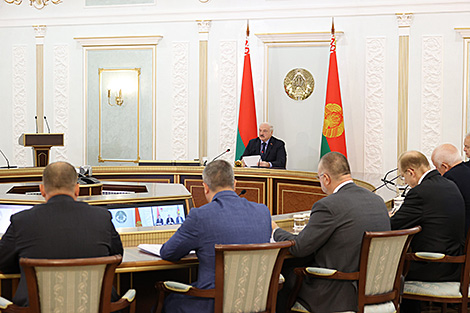
MINSK, 21 July (BelTA) – Instead of complaining about the weather it is necessary to work hard in the fields. Belarus President Aleksandr Lukashenko gave the relevant instruction during a conference call held on 21 July to discuss the harvesting campaign, BelTA has learned.
During the conference call the oblast governors presented reports on the situation in their regions. The head of state gave clear instructions to focus primarily on problems without self-evaluation.
Aleksandr Lukashenko stressed: “I’d like to warn the speakers: we are fed up with projections. There is no need to talk about it today. Give me facts. What are your problems, shortcomings? Openly and honestly. Thousands of people can hear you.”
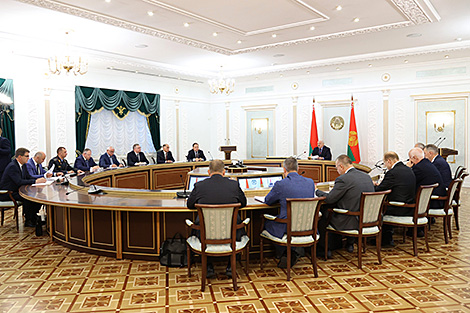
Minsk Oblast: Things are complicated but there is no catastrophe
The Minsk Oblast governor noted that the situation in the central region is complicated but it is not catastrophic. “We don’t have problems unrelated to peculiar weather and climate conditions. Rains have started and today we see how our corn matures. This is why we have no issues that need to be addressed at the level of the head of state,” Aleksandr Turchin said.
Yet the chairman of the Minsk Oblast Executive Committee asked for the president’s assistance with one thing. By 1 August Minsk Oblast agricultural enterprises are supposed to pay off the loans they took out last year to pay for fuel. “Taking into account the circumstances it will be extremely difficult to do. We ask for postponing the deadline at least a bit. But Minsk Oblast has honored all the other commitments to repay state budget loans and the rest however difficult it may have been,” the governor said.
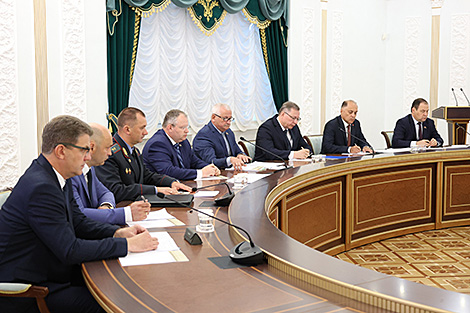
“The government will make a decision on all the problems you’ve mentioned, including the repayment [of loans], this week and the next one,” the head of state promised.
Aleksandr Turchin said: “Thank you very much for support.”
The president said: “But wait. I didn’t say what decision will be made. A decision will be made. But you are quite a good economist. You know that debts must be paid. If someone doesn’t pay up, then there will be problems after some time. But taking into account all the circumstances you and the government will sort it out and will submit proposals to me next week at the latest.”
Speaking about weather conditions, Aleksandr Lukashenko pointed out that the situation varies from region to region: soils have been affected more in some regions and less in other ones.
“I understand perfectly well that these are not last year’s conditions. If it has not rained in the country for 40 days, then naturally all the districts have been affected somehow. But complaining about the disaster, about all the dried-out crops is wrong. No, we will not get last year’s record-high harvest but I don’t demand it from you. While you managed to harvest 10.5 million tonnes of grain of all crops last year, I ask you to deliver 9 [million tonnes this year]. And we can gather it in if we organize well and if we maintain good discipline. If the machine operator takes care of the state of the harvester… It is the job of the engineer, the agronomist, the executive and, first and foremost, the machine operator. If we preserve the grain that is in the field now, then we will have the harvest,” the head of state stressed.
Aleksandr Lukashenko went on saying: “I make harsh demands from you and persuade you not because I have nothing else to do. The situation is very complicated. This is why as thoughtful managers we need some reserves. Who can say what will happen at the end of the year or the next year? No one. This is why let’s create stockpiles and reserves. If we have cereals, then we will have something to feed animals and poultry with. There must be discipline everywhere. All the decisions have been made. Cards are in your hands. Make demands from machine operators, milkmaids, specialists, executives all the way to members of the government.”
Grodno Oblast: The standard volume of cereals will be gathered in
According to Chairman of the Grodno Oblast Executive Committee Vladimir Karanik, there are no special problems in this region either: the machines and vehicles have been repaired, workforce is available, sources of funding have been determined.
Vladimir Karanik said: “As for weather conditions, Grodno Oblast saw only 28% of the standard amount of rain in May-June. We were affected less than other regions. About 1% of the cereal crops has died or has been switched to forage. The yield is slightly lower in comparison to last year’s record highs but according to our calculations, we will manage to get the average annual grain yield. In other words, we will not reach last year’s record highs but the standard amount of cereals that Grodno Oblast usually collects will be collected. Considering the available reserves and the decision to import grain, we don’t expect any problems with supplying the animal husbandry industry and the population with cereals.”
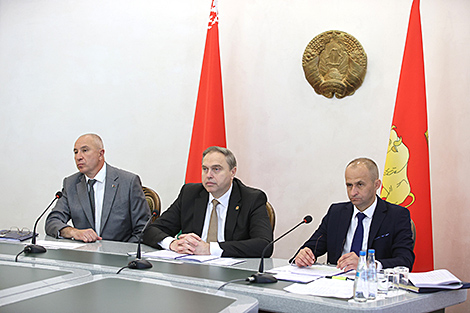
Yet the oblast governor stated that the forage harvesting situation is more complicated: the first grass cutting was worse than last year’s, this is why there are losses and the progress is slightly behind the schedule. “We will miss the average figure a bit but considering the leftovers we don’t expect problems with forage availability,” the governor said.
Brest Oblast: The situation is better than the country’s average
In Brest Oblast the situation is slightly better than the country’s average. According to the oblast governor, as much as 12% of the area under crops has been harvested, with the average yield at 41 centners per hectare, which is on par with last year’s figure. Rapeseed’s yield is slightly above last year’s: 30 centners per hectare, up from 24 centners per hectare in 2022. “We intend to gather in 1.250 million tonnes without buckwheat, corn, and millet. The figure corresponds to Brest Oblast’s average,” the governor Yuri Shuleiko said.
Speaking about forage harvesting, the governor told the president that last year’s level had been reached and the oblast intends to hit this year’s target.

Aleksandr Lukashenko asked the Brest Oblast governor whether there are problems with payments for the grain bought as state-guaranteed orders and whether grain had been taken from agricultural enterprises without timely payments anywhere.
“There are no facts like that. Acquisition and payments for grain deliveries proceed on schedule,” the chairman of the Brest Oblast Executive Committee said.
Mogilev Oblast: One problem while the rest can be resolved
Chairman of the Mogilev Oblast Executive Committee Anatoly Isachenko said that Mogilev Oblast is supposed to gather in 322,000ha of cereals and leguminous crops. The figure does not include grain maize, buckwheat, and millet.
All the districts of the oblast have already started harvesting cereals and winter rapeseed. Grain purchases have also begun as part of state-guaranteed orders. At present 30% of the targeted amount of winter barley has been sold. Deliveries of food grain and brewer’s barley continue.
Preliminary calculations indicate that the expected gross harvest will enable full deliveries of cereals to cover state needs, the head of the oblast administration assured.
The rest of the cereals will be used for forage.

The harvesting campaign will involve over 1,000 grain harvesters. Their readiness is at 99%. As many as 95% of the harvesters have passed technical inspections. “The necessary number of machine operators is available. All the necessary conditions have been enabled for participants of the harvesting campaign: hot meals, protective clothes, a labor remuneration system has been worked out and explained,” Anatoly Isachenko said.
In turn, the readiness of grain drying complexes in the region stands at 99%.
Preparations for sowing winter crops are already in progress in the region: fertilizers are being introduced and fields are being tilled.
“We don’t see problems. Everything proceeds as usual. There is one issue. It concerns fuel. We will use all the resources that we have. We don’t expect we will have all the fuel that we need till 1 September. Taking into account the harvesting of corn. This is why today I’d like to discuss this issue together with the central government. The one issue that exists. We are dealing with the other issues and will resolve them,” the Mogilev Oblast governor said.
Anatoly Isachenko explained the shortage of fuel by mentioning the current weather conditions, due to which additional work needed to be done in the fields.
Vitebsk Oblast: The roadmap covers every case but there is no space for retreat
Chairman of the Vitebsk Oblast Executive Committee Aleksandr Subbotin informed about plans to begin the active phase of the harvesting campaign by the end of the next week – in 7-10 days. Six districts of the oblast have already started harvesting winter wheat.
As much as 76% of the area under winter barley has been processed. The average yield stands at 26 centners per hectare although it has been at 29.4 centners per hectare for the last few days. Slightly more than 25,000 tonnes of barley has been collected.
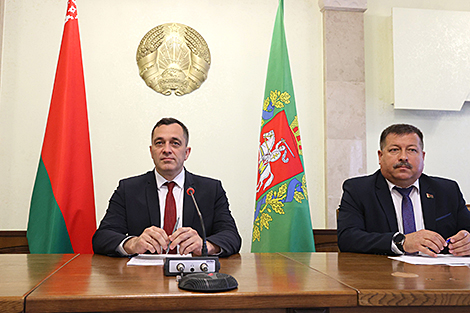
“We started carefully harvesting rapeseed and winter crops in places where crops were ripe. The yield is close to 16.4 centners per hectare. It is approximately as much as it was last year,” the head of the Vitebsk Oblast administration noted.
Aleksandr Subbotin assured that Vitebsk Oblast is ready for the active phase of the harvesting campaign as a whole. All the harvesters will become ready by 24-26 July and the vehicles will pass technical inspection as they are supposed to.
As far as grain-drying facilities are concerned, only one is not ready still but it is supposed to be commissioned literally the next day.
All the issues with workforce availability have been taken care of. “We phone every person. Enterprises and the Defense Ministry help us out. The Emergencies Ministry helps this year, too, by providing machine operators, who have the necessary skills and documents,” Aleksandr Subbotin said.
“Everyone is in mood to gather in the crops and to already make headway into securing next year’s harvest. We intend to work rather productively. To sow more winter crops and do more autumn ploughing. The vehicle fleet is also ready for it,” he said.
Aleksandr Subbotin also informed those present about how Vitebsk Oblast is implementing the instruction to repair all the broken vehicles and machines: “We are working intensively. This year out of this scrap we have assembled and will use 38 harvesters and 102 tractors. Both the central government and the ministry keep an eye on our work. Including visual control.”
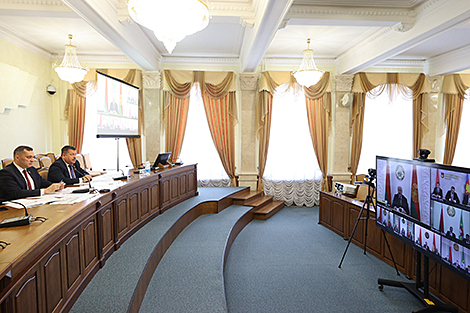
Speaking about the harvesting of grass forage, the official said that despite the increased harvesting area this year’s yield is unfortunately lower. Nevertheless, programs on fixing the lack of forage are in place in every district and every state-run agricultural enterprise. “The roadmap covers every case,” the governor assured.
The second grass cutting has yet to begin. The oblast also expects some harvest of interplanted crops. There are plans to gather in at least as much corn as last year.
After hearing out the report, Aleksandr Lukashenko even commended the Vitebsk Oblast governor for getting to know the intricacies of agriculture after working in other high-ranking positions previously: “I should say I am already glad to hear how precisely you speak and use agrarian terms. It means you will become good at it. You are already moving away from professorial language and are becoming a genuine agricultural process engineer.”
“Keep in mind that neither [Mogilev Oblast Governor Anatoly] Isachenko nor [Gomel Oblast Governor Ivan] Krupko nor you have space for retreat. That’s it! Nowhere to retreat to! Eastern regions have to secure progress. They need to develop and give good dynamics,” the Belarusian leader stressed.
Gomel Oblast: Time to pull out the region from the swamp but there are also positive things
All the districts in Gomel Oblast have already started harvesting. So far 16% of the cereals have been gathered in. Rapeseed harvesting is nearing completion. The yield is expected to be higher than last year’s due to larger areas. Shipments as part of state-guaranteed orders have begun. The target will be hit.
“As for winter barley, it wintered well but there were floods. And it was affected by hot weather when it was maturing. At present we have 22-23 centners per hectare. But the gross yield should be three times as much as last year,” Chairman of the Gomel Oblast Executive Committee Ivan Krupko said.
The readiness of vehicles and machines in the region allows harvesting up to 5% of the area under crops daily. Sufficient grain drying capabilities are available.
The governor stated that weather conditions had affected headed crops but the oblast had reacted promptly to it. There are plans to compensate for the shortage with corn. “Our harvesting area is essentially being equalized with last year’s. And together with corn we expect the gross yield of 1.05 million tonnes. We will miss about 10% of the headed crops but thanks to grain maze (over 100,000 tonnes as against 2022) we will satisfy the animal husbandry’s demand by 90%,” Ivan Krupko said.
Financial resources for buying additional cereals are available. Workforce availability has been secured.
Projections concerning grass forage look good although the first grass cutting was a bit below the target. “We expect 1.250 million tonnes of haylage, 50,000 tonnes up from 2022,” the governor said.
In his words, additional fertilizers have been applied to 100% of the area under corn and 70% of the area under grass after the first cutting. “We expect we will get 4 million tonnes of green corn mass, which will allow us to hit the forage target,” the head of the Gomel Oblast administration assured.
Ivan Krupko also raised the matter of fuel. The region will have enough reserves for July, August, and some part of September. “Indeed, rescheduled loans may be necessary taking into account the large amount of work: sowing, harvesting of corn, autumn ploughing. We will repay the previous ones. If need be, allow me to raise this issue.”
The governor also spoke in response to the critical remarks voiced earlier about Gomel Oblast. He assured that all these problems are being dealt with at the level of defense, security, and law enforcement agencies. Clear decisions are being made and control over their implementation is in place. “As for the loss of cattle, you are right. Not much has been done. But the little we’ve done has allowed increasing the number of cattle by 10,000 head as against 2022. We see what needs to be done and I think we will have results,” Ivan Krupko said.
The Belarus president said: “Thank you, Ivan Ivanovich [Krupko]. You and [Head of the Belarus President Property Management Directorate, Commissioner for Gomel Oblast Yuri] Nazarov have extraordinary powers. Make up your minds. Invite any minister for your aid. They will come and will provide assistance to you. But it is necessary to pull Gomel Oblast out of the swamp. It won’t do. A beautiful region. Beautiful people. But we are still floundering over there. This is why implement the most decisive measures.”



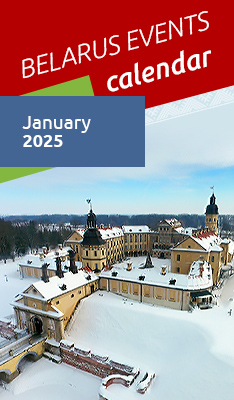




 print version
print version make home page
make home page add to bookmarks
add to bookmarks

